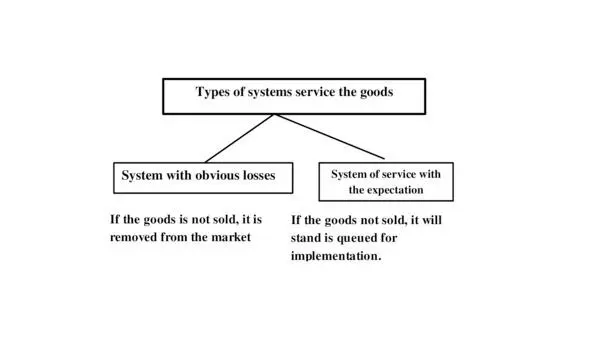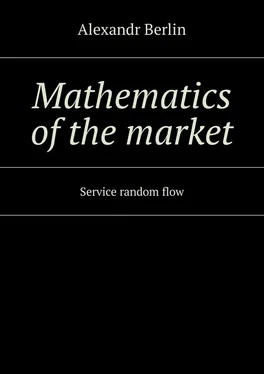.Systems of the second type – they sell goods given the specified priorities and limitations for individual consumers or consumption. For example, the sale of tobacco, alcohol, weapons … systems of this type is called “ not full accessibility system”.
If the order is accepted, the distribution system seeks deliver its in the system consumption.
Consumption system serves the flow of goods. This is reflected in the fact that individual consumer or group of consumers can buy the offered goods or to refuse from the purchase.
If all consumer groups are busy, then the system of consumption is refuses from the purchase of goods, i.e. occur losses.
And not purchased goods more is not offered for example can be removed or in distribution system can be supplied to the queue for waiting the implementation (the accumulation and storage of goods). In this case it is important to know the waiting time t
2.2. Types of SERVICE systems and input flows goods
Flow of events (in our case products) is a sequence of goods coming through any interval or any moment of time.
Deterministic flow of events – the sequence in which events arrive in a certain, strictly fixed non-random moments or in certain, strictly fixed, non-random intervals. For example, sale of products from the conveyor.
The random flow of events is differs from the deterministic, only one property that the moment of the arrive of goods and intervals arriving time between deliveries are not strictly fixed and random variables. Deterministic flow is a special case of random flows and is rare in practice. Strictly speaking, even such flows often contain moment’s fortuity. In this regard, in the theory of mass service flows basic attention is devote the consideration of random call flows.
The flow of events can be determined by one or more of the three equivalent ways:
1. A sequence of moments of occurrence of the event t 1 , t 2,…, t n,,
For example, the probability of admission of a particular product, and at the time t 1 .
This may be a possibility that mobile phones will be shipped to the store every Friday.
In the lottery is, for example, the probability of occurrence in the draw of lottery with numbers 5, 7, 15 will be the number 6. These events i can be described as moments of time.
2 The sequence of intervals between the events – the moments of z 1, z 2,…, z n
Example, the probability that mobile phones will be shipped to the store every 7 days.
In the lottery is, for example, the probability of occurrence number 6 every 5 lottery draws.
3. A sequence of numbers k 1, k 2,…, k n, determining the quantity of events arriving within the time intervals [ t 0, t 1), [ t 0, t 2),…, [ t 0, t n).
Example, the probability that during 5 months (counted from the initial moment t 0 – t 15) fresh fish will goes on sale 5,6, … 10 times.
2.2.1. Types of systems service goods
Below show a classify service goods, it is widely used in queuing theory [2.1], but in the economy has not yet is applied.
Types of systems service the goods is shown on Fig.2.2

Figure 2. 2. Types of systems service the goods
We will explain the figure
System with obvious losses
System, in which if the goods is not sold, then it is removed from the market, is called system with obvious losses
System of service with the expectation
System, in which if the goods is not sold, then it will stand is queued for implementation is called system of service with the expectasion
2.2.2. The types of input flows
The flow of goods is a sequence of goods incoming through any interval or at through any moments of time.
Deterministic flow of events – the order in which events arrive in a certain, strictly fixed non-random moments or in certain, strictly fixed, non-random intervals. For example, sale of products from the conveyor.
The random flow of events differs from the deterministic, those and only, that moments of supply of goods and intervals between deliveries are random variables, but not strictly fixed values. Deterministic flow is a special case of random flows and is rare in practice. Strictly speaking, even in such streams often occurs a random event.
The flow of events can be determined by one or more of the three equivalent ways:
Конец ознакомительного фрагмента.
Текст предоставлен ООО «ЛитРес».
Прочитайте эту книгу целиком, купив полную легальную версию на ЛитРес.
Безопасно оплатить книгу можно банковской картой Visa, MasterCard, Maestro, со счета мобильного телефона, с платежного терминала, в салоне МТС или Связной, через PayPal, WebMoney, Яндекс.Деньги, QIWI Кошелек, бонусными картами или другим удобным Вам способом.













